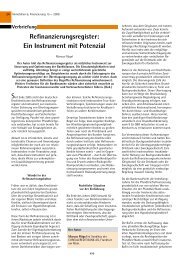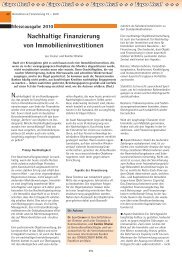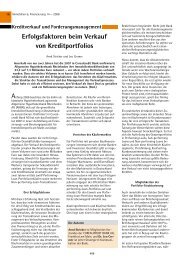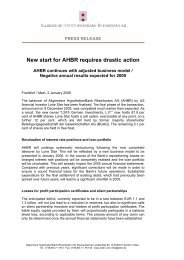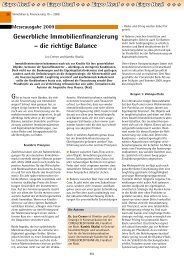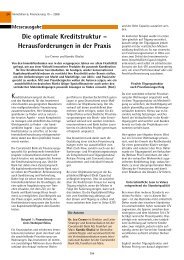COREALCREDIT BANK AG
COREALCREDIT BANK AG
COREALCREDIT BANK AG
Create successful ePaper yourself
Turn your PDF publications into a flip-book with our unique Google optimized e-Paper software.
Floating Rate Notes<br />
A key difference between Floating Rate Notes and Fixed Rate Notes is that interest income on<br />
Floating Rate Notes cannot be anticipated. Due to varying interest income, investors are not able<br />
to determine a definite yield of Floating Rate Notes at the time they purchase them, so that their<br />
return on investment cannot be compared with that of investments having fixed interest rates. If<br />
the Terms and Conditions of the Notes provide for frequent interest payment dates, investors are<br />
exposed to the reinvestment risk if market interest rates decline. That is, investors may reinvest<br />
the interest income paid to them only at the relevant lower interest rates then prevailing.<br />
Neither the current nor the historical value of the relevant floating rate should be taken as an<br />
indication of the future development of such floating rate during the term of any Notes.<br />
Reverse Floating Rate Notes<br />
The interest income of Reverse Floating Rate Notes is calculated in reverse proportion to the<br />
reference rate: if the reference rate increases, interest income decreases whereas it increases if<br />
the reference rate decreases. Unlike the price of ordinary Floating Rate Notes, the price of<br />
Reverse Floating Rate Notes is highly dependent on the yield of Fixed Rate Notes having the<br />
same maturity. Price fluctuations of Reverse Floating Rate Notes are parallel but are substantially<br />
sharper than those of Fixed Rate Notes having a similar maturity. Investors are exposed to the risk<br />
that long-term market interest rates will increase even if short-term interest rates decrease. In this<br />
case, increasing interest income cannot adequately offset the decrease in the reverse floater's<br />
price because such decrease is disproportionate.<br />
Zero Coupon Notes<br />
Zero Coupon Notes do not pay current interest but are issued at a discount from their nominal<br />
value. Instead of periodical interest payments, the difference between the redemption price and<br />
the issue price constitutes interest income until maturity and reflects the market interest rate. A<br />
holder of Zero Coupon Notes is exposed to the risk that the price of such Notes falls as a result of<br />
changes in the market interest rate. Changes in market interest rates have a substantially stronger<br />
impact on the prices of Zero Coupon Notes than on the prices of Fixed Rate Notes because the<br />
discounted issue prices are substantially below par. If market interest rates increase, Zero Coupon<br />
Notes can suffer higher price losses than other Notes having the same maturity and a comparable<br />
credit rating. Due to their leverage effect, Zero Coupon Notes are a type of investment associated<br />
with a particularly high price risk.<br />
Foreign Currency Notes<br />
A holder of Notes denominated in a foreign currency and a holder of Dual Currency Notes is<br />
exposed to the risk of changes in currency exchange rates which may affect the yield of such<br />
Notes. Changes in currency exchange rates result from various factors such as macro-economic<br />
factors, speculative transactions and interventions by central banks and governments.<br />
A change in the value of any currency other than Euro against the Euro, for example, will result in<br />
a corresponding change in the Euro value of Notes denominated in a currency other than Euro<br />
and a corresponding change in the Euro value of interest and principal payments made in a<br />
currency other than in Euro in accordance with the Terms and Conditions of such Notes. If the<br />
underlying exchange rate falls and the value of the Euro correspondingly rises, the price of the<br />
Notes and the value of interest and principal payments made thereunder expressed in Euro falls.<br />
Notes containing Early Redemption Rights of the Issuer<br />
The applicable Final Terms will indicate whether an Issuer may have the right to call the Notes<br />
prior to maturity (optional call right) on one or several dates determined beforehand or whether the<br />
39






